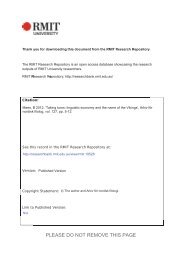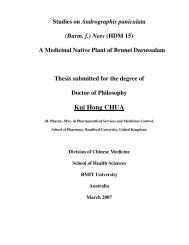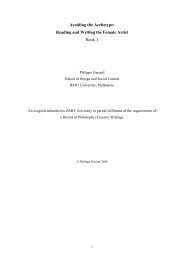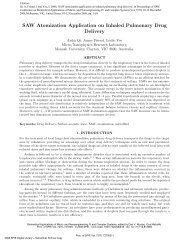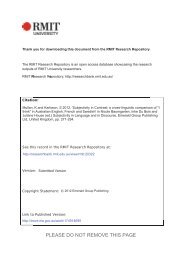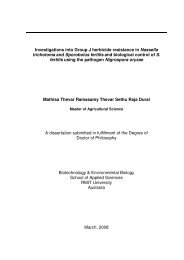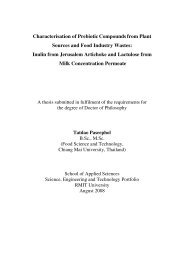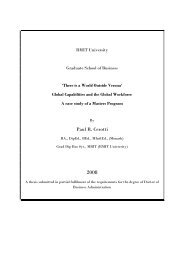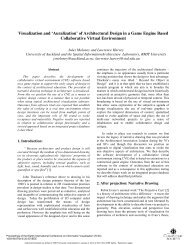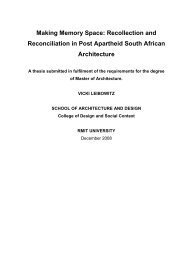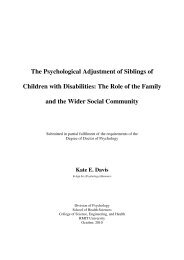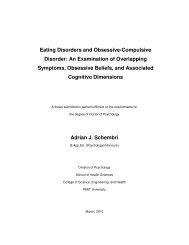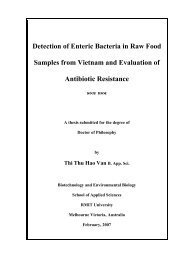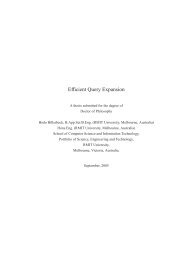Objects in Flux - RMIT Research Repository - RMIT University
Objects in Flux - RMIT Research Repository - RMIT University
Objects in Flux - RMIT Research Repository - RMIT University
You also want an ePaper? Increase the reach of your titles
YUMPU automatically turns print PDFs into web optimized ePapers that Google loves.
dynamic. When consumer practices are reduced to a reflection of<br />
capital processes, when they are taken as a mirror of professional<br />
practice (Leadbeater & Miller, 2004) or regarded as a research and<br />
development department driven by an equation of function and need<br />
(Von Hippel, 2005), important qualities of these practices are lost.<br />
These methods of fram<strong>in</strong>g, that conflate work and leisure, make work<br />
the def<strong>in</strong><strong>in</strong>g form, the structure by which production is ultimately<br />
tested and judged. Such an approach does not give adequate account<br />
of productive acts that take place outside the capitalist economy. We<br />
must remember that commercial production is but a subset of human<br />
production and should not be used as the bluepr<strong>in</strong>t by which all productive<br />
acts are judged.<br />
Contrary to much of the rhetoric surround<strong>in</strong>g emergent consumer<br />
production, dist<strong>in</strong>ctions between producers and consumers, as given<br />
through relations of power and modalities of action, cont<strong>in</strong>ue to def<strong>in</strong>e<br />
the space of consumption. The emancipatory technology that has<br />
given visibility to divergent consumer practices has also allowed these<br />
practices to be targeted, manipulated, and captured by commercial<br />
<strong>in</strong>terests. If the consumer is to be productive and make this production<br />
known, then their actions are generally subject to commercial control.<br />
It is worth not<strong>in</strong>g that while farmers <strong>in</strong> the early 20th C. were free to<br />
t<strong>in</strong>ker with the automobile, the owners of the Aibo robotic dog did not<br />
have the same rights.<br />
7.3 Freedom<br />
Despite complex control mechanisms, the research f<strong>in</strong>ds that practices<br />
of consumer production have consistently challenged commercial<br />
<strong>in</strong>stitutions. From the 1960s onwards acts of consumer production<br />
were seen as a means for activat<strong>in</strong>g social change, where practitioners<br />
enacted change <strong>in</strong> their own lives through direct action. Central to<br />
this approach is a belief that <strong>in</strong>formation should be free and open to<br />
everyone, an attitude that is visible with<strong>in</strong> the Whole Earth Catalogue<br />
(Brand, 1968), Jencks’ ‘resource-full computer’ (1972), punk and<br />
post-punk z<strong>in</strong>e production (Triggs, 2006) and hacker attitudes from<br />
MIT <strong>in</strong> the 1960s to the open source software developers of today<br />
(Levy, 1984). While this belief <strong>in</strong> freedom of <strong>in</strong>formation has become<br />
an <strong>in</strong>herited ideology with<strong>in</strong> practices of hack<strong>in</strong>g, modd<strong>in</strong>g and DIY,<br />
Conclusion<br />
131



